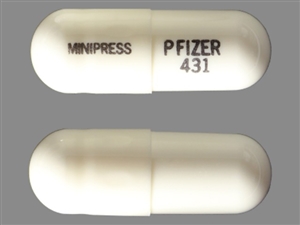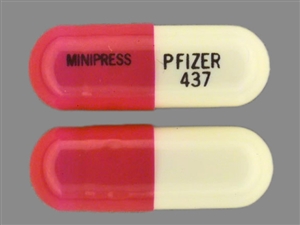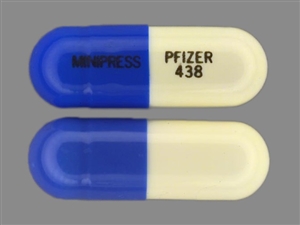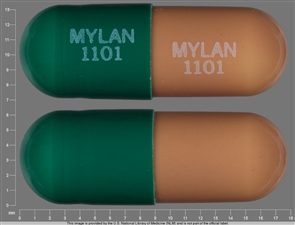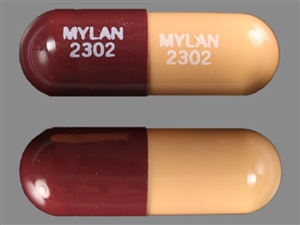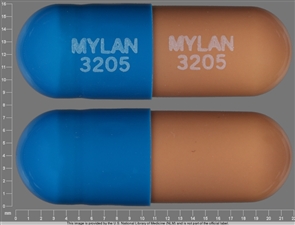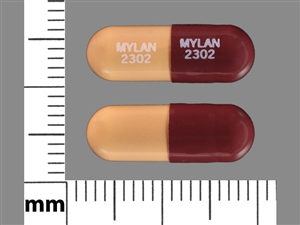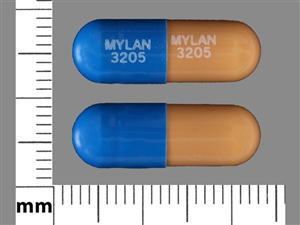What is the most important information I should know about prazosin?
Follow all directions on your medicine label and package. Tell each of your healthcare providers about all your medical conditions, allergies, and all medicines you use.
What is prazosin?
Prazosin is used to treat hypertension (high blood pressure). Lowering blood pressure may lower your risk of a stroke or heart attack.
Prazosin may also be used for other purposes not listed in this medication guide.
What should I discuss with my healthcare provider before taking prazosin?
You should not use prazosin if you are allergic to it.
Tell your doctor if you have ever had:
- low blood pressure, especially if caused by taking medications.
Prazosin can affect your pupils. If you have cataract surgery, tell your surgeon ahead of time that you use this medicine.
Tell your doctor if you are pregnant or plan to become pregnant. It is not known whether prazosin will harm an unborn baby. However, having high blood pressure during pregnancy may cause complications such as diabetes or eclampsia (dangerously high blood pressure that can lead to medical problems in both mother and baby). The benefit of treating hypertension may outweigh any risks to the baby.
It may not be safe to breastfeed while using this medicine. Ask your doctor about any risk.
Prazosin is not approved for use by anyone younger than 18 years old.
How should I take prazosin?
Follow all directions on your prescription label and read all medication guides or instruction sheets. Your doctor may occasionally change your dose. Use the medicine exactly as directed.
Prazosin lowers blood pressure and may cause dizziness or fainting, especially when you first start taking it, or whenever your dose is changed. You may feel very dizzy when you first wake up.
Your blood pressure will need to be checked often.
Swallow the capsule whole and do not crush, chew, break, or open it.
Keep using this medicine as directed, even if you feel well. High blood pressure often has no symptoms. You may need to use blood pressure medication for the rest of your life.
Prazosin is only part of a complete treatment program that may also include diet, exercise, weight control, and special medical care. Follow your doctor's instructions very closely.
Some things can cause your blood pressure to get too low. This includes vomiting, diarrhea, or heavy sweating. Call your doctor if you are sick with vomiting or diarrhea.
Store at room temperature away from moisture and heat.
What happens if I miss a dose?
Take the medicine as soon as you can, but skip the missed dose if it is almost time for your next dose. Do not take two doses at one time.
What happens if I overdose?
Seek emergency medical attention or call the Poison Help line at 1-800-222-1222.
Overdose symptoms may include extreme drowsiness or underactive reflexes.
What should I avoid while taking prazosin?
Avoid driving or hazardous activity until you know how this medicine will affect you. Your reactions could be impaired.
Avoid getting up too fast from a sitting or lying position, or you may feel dizzy.
Drinking alcohol with this medicine can cause side effects.
What are the possible side effects of prazosin?
Get emergency medical help if you have signs of an allergic reaction: hives; difficulty breathing; swelling of your face, lips, tongue, or throat.
Call your doctor at once if you have:
- a light-headed feeling, like you might pass out;
- pounding heartbeats or fluttering in your chest;
- new or worsening chest pain; or
- upper stomach pain, loss of appetite, dark urine, clay-colored stools, jaundice (yellowing of the skin or eyes).
Call your doctor or seek emergency medical attention if your erection is painful or lasts longer than 4 hours. A prolonged erection (priapism) can damage the penis.
Common side effects may include:
- dizziness, drowsiness;
- headache;
- feeling weak or tired; or
- nausea.
This is not a complete list of side effects and others may occur. Call your doctor for medical advice about side effects. You may report side effects to FDA at 1-800-FDA-1088.
What other drugs will affect prazosin?
Tell your doctor about all your other medicines, especially:
- propranolol;
- any other blood pressure medication;
- a diuretic or "water pill"; or
- sildenafil (Viagra) and other erectile dysfunction medicines.
This list is not complete. Other drugs may affect prazosin, including prescription and over-the-counter medicines, vitamins, and herbal products. Not all possible drug interactions are listed here.
Where can I get more information?
Your pharmacist can provide more information about prazosin.
Remember, keep this and all other medicines out of the reach of children, never share your medicines with others, and use this medication only for the indication prescribed.
Every effort has been made to ensure that the information provided by Cerner Multum, Inc. ('Multum') is accurate, up-to-date, and complete, but no guarantee is made to that effect. Drug information contained herein may be time sensitive. Multum information has been compiled for use by healthcare practitioners and consumers in the United States and therefore Multum does not warrant that uses outside of the United States are appropriate, unless specifically indicated otherwise. Multum's drug information does not endorse drugs, diagnose patients or recommend therapy. Multum's drug information is an informational resource designed to assist licensed healthcare practitioners in caring for their patients and/or to serve consumers viewing this service as a supplement to, and not a substitute for, the expertise, skill, knowledge and judgment of healthcare practitioners. The absence of a warning for a given drug or drug combination in no way should be construed to indicate that the drug or drug combination is safe, effective or appropriate for any given patient. Multum does not assume any responsibility for any aspect of healthcare administered with the aid of information Multum provides. The information contained herein is not intended to cover all possible uses, directions, precautions, warnings, drug interactions, allergic reactions, or adverse effects. If you have questions about the drugs you are taking, check with your doctor, nurse or pharmacist.
Copyright 1996-2020 Cerner Multum, Inc. Version: 7.01. Revision date: 11/26/2019.
